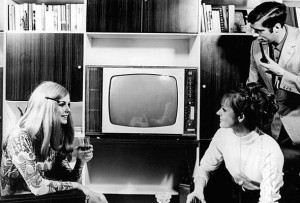Audiences gravitate towards stories about families because they capture the quirky, imperfect, and often hilarious dynamics of our own lives, and as a content creator, television is uniquely positioned to mirror our changing families and to help audiences navigate what it all means. Only recently, however, has the story been so colorful, and crowded. Here’s a look at how the changes in American families and their continually complicated stories get played out in entertainment.
In the 1950s, the family was viewed as one cohesive functional unit and the need for conformity was a recurring theme in programming. Demographically speaking, television reflected the fact that American households were primarily white, and on TV, white families stood in for other ethnic groups. After World War II, US consumers had more discretionary income and the population was growing. With more money and bigger families, people began moving to the then-new suburbs. Television telegraphed these demographic changes, turning raw data into stories that fueled shows as The Real McCoys, The Donna Reed Show, Bewitched and Father Knows Best.
By the 1970s, the American family had begun a process of dramatic change. Divorce rates doubled, we saw the development of blended families, and the face of the American public was becoming a true melting pot, a multicultural mixture of ethnicities, races and religions under a single American identity. Again, television reflected these changes, now playing off family tension in such popular shows as the ground-breaking All In The Family and its spinoffs Maude, Good Times and The Jeffersons.
Recent demographic changes have further upended American society and culture. We are more diverse than ever, and in a demographic first, immigrant families accounted for the majority of births in 2010. Census data also indicates that there is no longer a “typical” American family as they are headed by divorced, married, single parents, married couples and a rising number of same-sex married and unmarried couples.
This new data reflects our changing attitudes about families and the ways parents and kids should live and love. It is opening up a new canvas on which we can write stories and create meaningful content that is truly modern and celebrates everyone in the household. I have no doubt that television will continue to play a critical role in shaping and depicting family stories and in doing so, attract more audiences.
This is an edited excerpt of Oishii Partner Kate Canada Obregon’s article “Television and The Modern Family Mash-Up,” which appears on Cynopsis Cynsiders. You can read the full text of the article here: http://www.cynopsis.com/cyncity/television-modern-family-mash/

